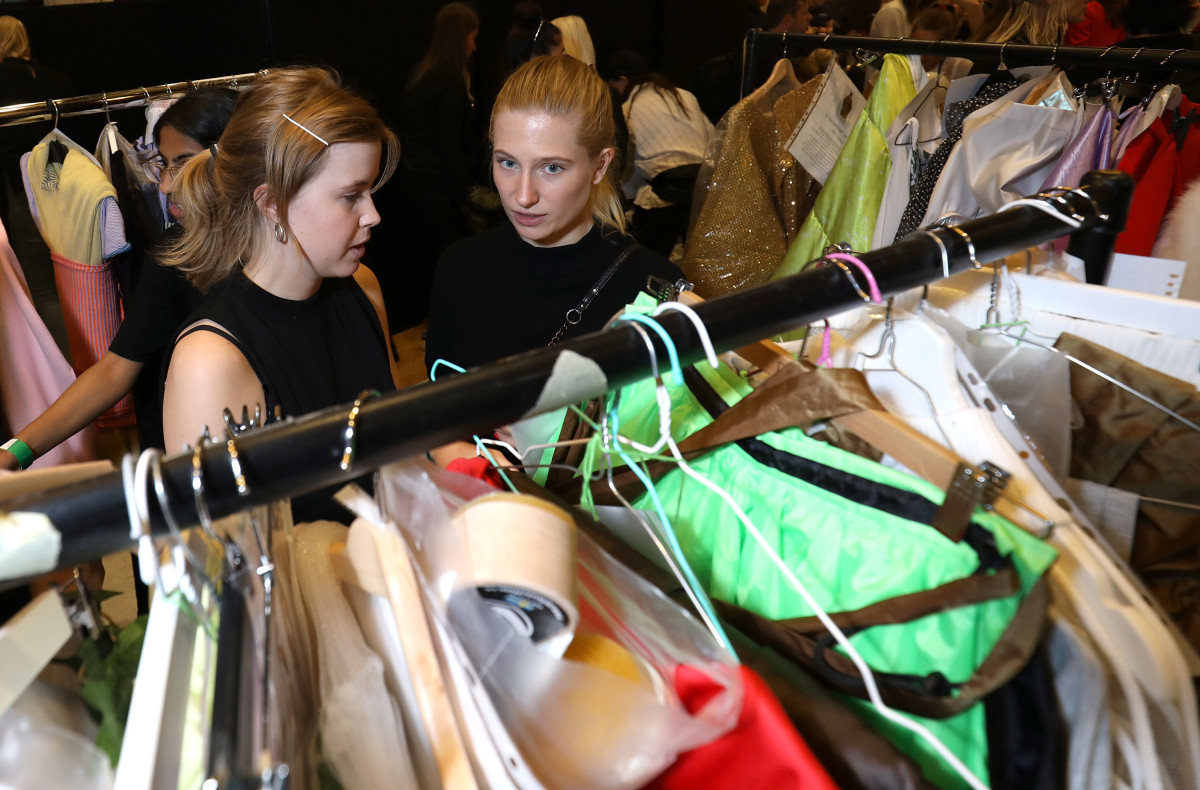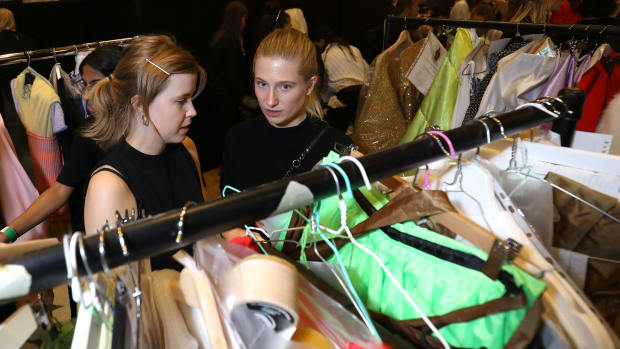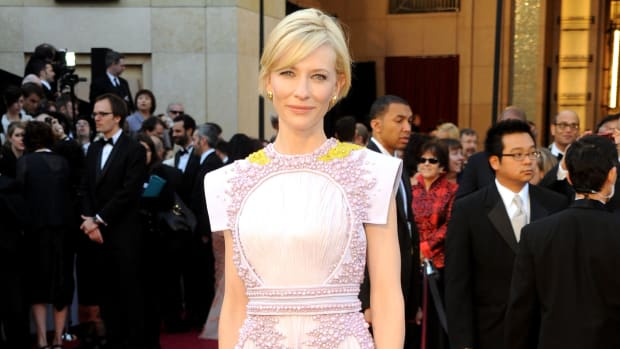Photo: Tim P. Whitby/Getty Images
One of the questions we're asked most often by young people is what they need to be prepared for a career in fashion, and the answers most fashion professionals will give you are: relevant, hands-on experience, an understanding of the business side of fashion, and industry connections.
These things are not always part of a typical undergraduate curriculum, but when Long Island University launched its Bachelor of Science in fashion merchandising in 2015, it decided to do things a little differently. Alongside their core academic requirements and the requisite courses on Buying, Import/Export, and Visual Merchandising, fashion students are offered a slew of opportunities that involve them in the industry and provide the business background and experiential learning needed to make it in the ever-changing world of fashion.
"We put together all of the creative aspects of fashion, along with the business end of fashion," explains Cherie Serota, director of the program, which is under the umbrella of LIU's business school. "We're preparing students for a hands-on opportunity to enter the fashion industry with a complete understanding of the business so that, if they choose, they can create their own fashion start-up armed with the knowledge, the skills and an overall sense of where fashion is heading. Really, we're preparing them for any route that they choose."
This well-rounded approach is built around key projects and experiences that set LIU apart: Students run an on-campus boutique where they manage the buying, merchandising, marketing and event planning; they hold annual fashion shows to showcase the designs in the student-run business; they take trips into NYC to visit showrooms and hear from fashion executives; and they take on consulting projects both at home and abroad. Below, Serota gives us the rundown on the most valuable opportunities the program has to offer.
Industry visits are a big part of the program, can you share some examples?
We're just 35 miles from New York City, so we go into the city a lot. We've met designers firsthand, such as Rebecca Minkoff, Elie Tahari, the owners of Vineyard Vines, Shep and Ian Murray, amongst others. The Women's Wear Daily Style Editor Alex Badia worked with our students behind the scenes to explain how and where the inspiration takes place and what makes something important enough to make it into a Women's Wear Daily article. Our students historically have worked at New York Fashion Week and regularly attend the trade shows at the Javits Center.
What about international trips?
Our goal is to go to a fashion capital each year. We've been to Paris, Florence and Milan. We had a trip scheduled for London in spring of 2020, but unfortunately it was cancelled last minute due to the pandemic. As a part of each experience, we take on a consulting project abroad. We'll start preparing for it months ahead at the university, and then we will go on the trip with an entire project brief three-quarters of the way done. Then, once there, with boots on the ground, we begin to take a deep dive into the business, the culture, the competitive landscape and other things that inspire our senses — food, smells, sights and sounds.
Can you give an example?
Sure. We were tasked with conceptualizing the term "Made in Italy" for a possible retail pop up inside of the Salvatore Ferragamo Museum in Florence; the team of Ferragamo was interested in seeing what American fashion students had to say. At home, on campus, we began to research and virtually "visit" other fashion museums or museums that contained fashion exhibits all over the world. The team assessed the competitive landscape and used this information as a baseline for the next steps.
Once we were on the ground in Florence, we were trying to really ascertain what it means to be made in Italy. We went to all of the Italian designer shops like Fendi, Gucci, Valentino, Prada and of course Ferragamo. We also visited artisans and multi-generational businesses that took pride in their heritage and their cultural roots. We ate pizza and pasta, viewed art and shopped in the local markets; we met proprietors, people in town and other students; asked questions and listened to their answers. Then, [the students] came up with an entire proposal and pitch deck to present to the marketing team at the Salvatore Ferragamo Museum. They looked at the project through the lens of Gen Z and the wants and needs of this generational cohort that was in fact their target customer.
Most recently, we delivered a similar type of consulting project for Hervé Leger. Hervé Leger was in the process of launching a new brand called Hervé, geared to the Gen-Z customer with a lower pricepoint. Our students loved this project because they were this customer. Consequently, they did a deep dive into who is Gen Z, what do they want, how much are they willing to pay for it, how do they wear it, where do they shop, and who are the key influencers they follow. They also presented the Hervé team with a mock-up Instagram, a social media proposal and a bunch of stellar launch ideas.
Do all fashion merchandising students get to participate in these projects?
Recommended Articles
The choice is theirs. Students can elect to travel and participate in that project, or if they prefer they can participate in a project at home, on campus, in a Brand Management class. Hervé Leger was part of Brand Management, whereas Ferragamo was part of the Global Fashion Consulting. If you are majoring in fashion merchandising, you will most likely be exposed to a consulting project.
Do these projects ever help students land jobs at the companies?
Many students have turned these opportunities into summer internships. Let's just say, when we visited a showroom and have had a student who is bold enough to ask, 'Do you have any jobs this summer?' it has always materialized into something very positive.
Students can also get retail and fashion-show production experience on campus. What does that entail?
We put on a runway show every year; the Fashion Club oversees that and they work in tandem with the Student Body Boutique, a student-run on-campus clothing store. All the clothes for the fashion show come from either the Student Body Boutique, student creators or repurposed clothing. The Boutique is run, for the most part, by our fashion merchandising majors.
The students do the buys, they go to the Javits Center and pick out merchandise at the biannual trade shows held there. They look at reports to see what categories are selling well and which aren't, and then they create a markdown schedule. They do all the special events for the store. They merchandise the store. Basically, they are in charge of every aspect of the store from A to Z. The store profits are earmarked for the fashion merchandising program and used for scholarships and trips abroad.
There's also a big entrepreneurial component to the curriculum. Can you share more about the Capstone project?
Capstone is a culmination of their four years with us. Consequently, students are tasked with creating a fashion brand, product or company and taking it from conception to completion. The other students serve as the C-suite and the class becomes the boardroom. We meet on a weekly basis and we take tiny bites out of building each business. It is really manageable… They start with the actual idea, then the next week they work on the mission statement, the vision statement, they work on the actual design components and so forth and so on, until they get to the final presentation, which is represented in a pitch deck to a panel of judges, some from the industry and others from academia. The final presentation is not only an oral presentation, but it's also a complete business proposal, a brand book and product samples.
Do students ever end up starting these businesses for real?
Many of them have left to start this business, or with the intention to start the business, because it's really at the point where they could give it a green light if they choose to.
How else does the curriculum prepare students for an industry that is always changing and evolving?
We're always looking at our program and amending it based on what the industry needs. Right now, sustainability is extremely important so we added that in as a requirement. We know that inclusivity and diversity are super important, so those are touched upon in many, if not all, of our courses. Same with transparency and authenticity — we look at blockchain and how a company can be transparent through their supply chain.
Many of our professors come from the industry, if not all. So they are all extremely knowledgeable and are teaching what they know from on-the-job experience. They teach what they know from living through it. Of course, this also helps with connections, securing internships and procuring visits up to showrooms, companies and brand headquarters to learn firsthand what it really means to work in the fashion industry.





